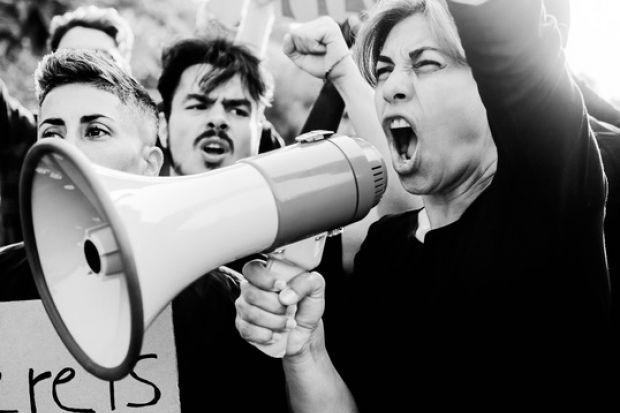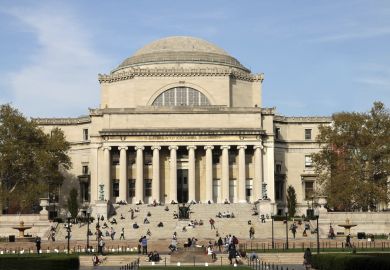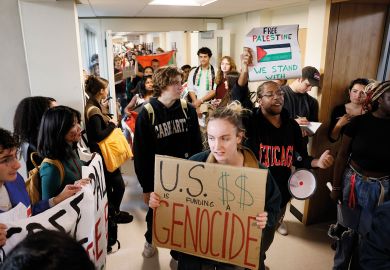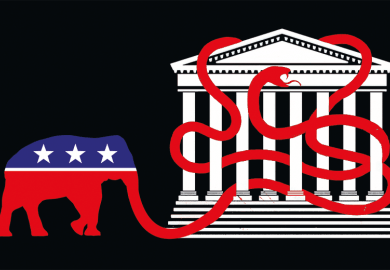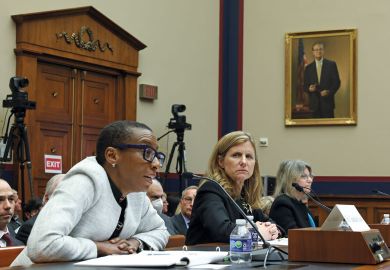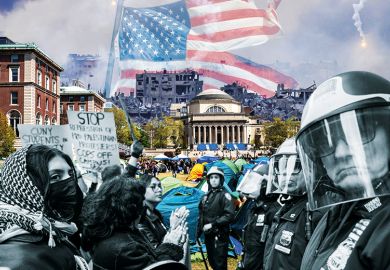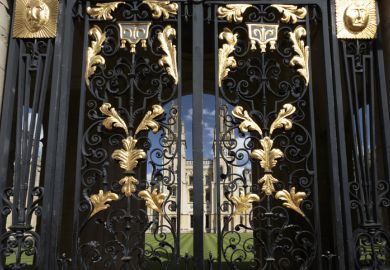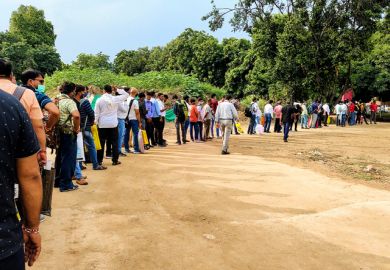US higher education appears to be further dividing in the face of prolonged partisan interference, with faculty declaring a unified series of nationwide protests just as administrators at several leading institutions embrace their own new speech-related restrictions.
The American Association of University Professors (AAUP) said it expected faculty and student groups at more than 50 US campuses to join its 17 April National Day of Action as a “nationwide counter-offensive against the sustained right-wing assault on American higher education as a public good”.
The AAUP is assembling the movement amid a cascading number of cases in which US colleges and universities – including some of the most prominent – are enforcing their own limits on student protest in line with the demands of powerful donors and politicians.
Among many examples over the past few months, some of the more recent include the University of Michigan, which is promising to forbid what it regards as disruptive protests; Columbia University, which indefinitely suspended four students who participated in an unauthorised protest on behalf of Palestinians; and Vanderbilt University, which expelled three students and suspended one other who joined a protest for fossil fuel divestment.
Campus resource collection: Teach your students to be engaged citizens
Faculty at several state institutions in North Carolina have held no-confidence votes in their administrations over their handling of outside political pressures. And professors at the University of Texas are protesting against a series of politically mandated job cuts aimed at eliminating staff statewide who work to promote diversity in higher education.
The collective protest this month will involve faculty and student groups at more than 50 US campuses – both two-year and four-year, both public and private. The day will include a variety of rallies and teach-ins, according to the 45,000-member AAUP, which is organising the effort with other education-focused labour groups.
“As educators and workers and as members of the public,” the organisers said, “we will not allow politicians, trustees, donors and corporate management consultants to destroy our world-leading universities and colleges, to hijack open inquiry in our classrooms, to reverse the gains of the civil rights movement by attacking equity and diversity, and to silence dissent on campuses and in our society broadly.”
The faculty response stands in contrast to that of the nation’s campus presidents, many of whom have offered occasional expressions of support for academic freedom but generally have remained silent or even acquiesced in partisan attempts to silence them and their campus communities.
The most recent past presidents of Harvard University and the University of Pennsylvania stepped down from their jobs after first seeking ways of mollifying donors and congressional Republicans who demanded that they denounce and even punish students who expressed support for Palestinian victims of Israeli military attacks.
Columbia acted against its pro-Palestinian student protesters a few weeks after the university’s president, Baroness Shafik, was told to appear before the same education committee of the US House of Representatives that demanded a similar crackdown when it grilled the subsequently ousted presidents of Harvard and Penn. The AAUP scheduled its nationwide series of demonstrations for the same day, 17 April, that Baroness Shafik is scheduled to make that appearance before the Republican-led committee.
That committee has made clear that it is far from done with such work, with the Massachusetts Institute of Technology, the University of California, Berkeley, and Rutgers University among other institutions from which the committee’s Republican majority has been demanding answers about their tolerance of anti-Israel student protests.
The tensions at the University of Michigan centre on its president, Santa Ono, who was hired last summer by one of the nation’s top public institutions after developing a reputation at the University of British Columbia for a broad tolerance of perspectives. Professor Ono is now facing widespread criticism from students and faculty after he encountered loud anti-Israel protests at a convocation event and responded with the promise of a new policy that would impose tough new punishments for anyone disrupting official university events.
Register to continue
Why register?
- Registration is free and only takes a moment
- Once registered, you can read 3 articles a month
- Sign up for our newsletter
Subscribe
Or subscribe for unlimited access to:
- Unlimited access to news, views, insights & reviews
- Digital editions
- Digital access to THE’s university and college rankings analysis
Already registered or a current subscriber? Login
